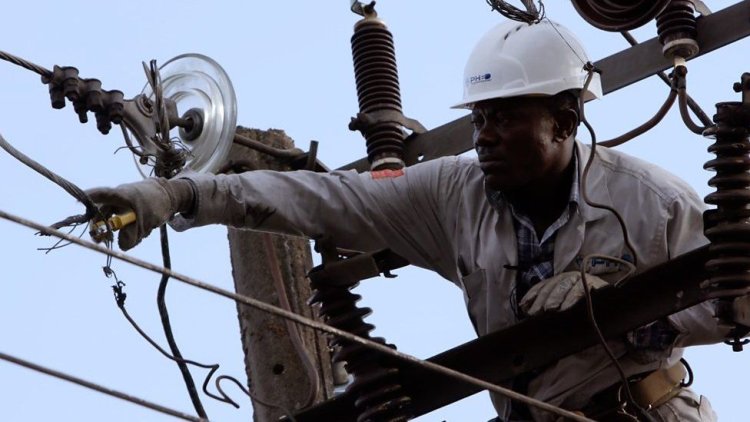Nigeria, where President Muhammadu Buhari had to apologize for a power outage
My ancestral home of Umujieze had no electricity until the late 1970s, when my father's close friendship with the state power company's then-manager, Nepa, influenced the decision to prioritize our village and connect us to the national grid.

Few legends about the West are as appealing to many Nigerian children who have never traveled outside of the country as the concept that power may be turned on from nightfall to dawn seven days a week.
"Ehhhh?!" When provided with this fact, I've often heard children exclaim in awe.
There will be no blackouts just as Mummy is about to iron her shirt for work, or when Kelechi Iheanacho is about to take a penalty in a Super Eagles World Cup qualifying match.
Even the miracle of steady power - a basic characteristic of modern living that has eluded our beloved country for decades - can't compare to stories of snow, subterranean trains, or double-decker buses. Nigeria has been going through what is probably the most trying power outage the country has experienced since I was a child.
My favorite childhood memories from the 1980s were sitting with my family in our home in the south-eastern town of Umuahia late at night, the entire living room black saves for the glimmer of a kerosene lamp on the wooden center table.
We developed ways to spend the time and darkness with the TV turned off and the entire neighborhood quiet of the power outage.
My parents would usually tell us Igbo folk tales, many of which contained choruses that my brothers and I had to sing along to, or anecdotes from their childhoods in colonial Nigeria when many towns lacked electricity.
Wilfred Okonyia Okoroafor, my maternal grandfather, was one of the first persons in Oguta to own a Tilley lamp, according to my mother. As a result, in the early 1950s, their home was one of the few in the neighborhood to be lit by a technology that was both safer and more powerful than the typical fireplace or faint oil lamp.
My ancestral home of Umujieze had no electricity until the late 1970s, when my father's close friendship with the state power company's then-manager, Nepa, influenced the decision to prioritize our village and connect us to the national grid.
However, there is a significant difference between the times when my family used to tell ghost stories in the dark and today.
We knew it would only be a matter of time before the power was restored - possibly an hour or two, or three.
Except when something big went wrong, generally with the district's transformer, power outages rarely lasted more than a few hours, much alone days.
Nigerians, on the other hand, have become accustomed to the idea that our government just cannot generate enough energy for the entire country.
The Nigerian Electricity Power Authority, or Nepa, became nicknamed "Never Expect Power Always" after a joke.
The joke became "Problem Has Changed Name" or "Please Hold Candle Now" when the government renamed the corporation Power Holding Company of Nigeria (PHCN).
 When their government fails, Nigerians who can afford it always find a way to solve their concerns.
When their government fails, Nigerians who can afford it always find a way to solve their concerns.
For drinkable water, they dig boreholes in their backyards.
They either buy SUVs or pay bulldozers to grade and gravel the sections of the road on their usual travels to avoid the huge craters.
They hire professional security to guard their facilities and accompany them on travels to dangerous areas.
They buy electrical generators for their homes and offices, the size and efficiency of which are determined by the amount of money they have available.
The proliferation of generators, particularly low-cost Chinese generators, has resulted in noise pollution and poisonous gases that have killed families in their sleep in certain cases.
It also entails an increase in the cost of fuel to run the machines.
The wealthier you are, the more probable your generator will run continuously rather than only at night. Inverters have grown in popularity in recent years among those who can afford the uninterruptible power device that can be charged when the power is on and used as a standby during power outages.
Unfortunately, for many Nigerians, this ideal arrangement for dealing with a long-standing problem has been sabotaged in recent weeks.
President's apologies
A national gasoline shortage coincided with the national power grid's failure, which left parts of Nigeria's main cities, including Lagos and Abuja, in the dark for days.
Last Monday, President Muhammadu Buhari apologized to the country, saying, "I genuinely regret the inconvenience caused."
He blamed the fuel shortages on marketers, and the power outages on technical challenges, assuring that the two disasters will be rectified soon.
Many inverters were running out of battery power. Many people have generators but are unable to purchase fuel.
Even black market vendors, who often treble their prices at such times, couldn't guarantee a consistent supply.
Even the wealthy, who can pay any price for fuel, have been unable to avoid at least some of the darkness.
Nobody seemed to be in the mood to share traditional tales.

 Boakyewaa Lawrencia
Boakyewaa Lawrencia 

































